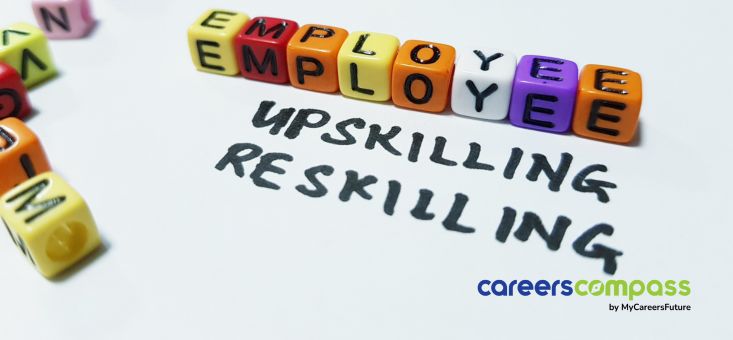Questions about Upskilling and Reskilling answered
- What is the purpose of upskilling?
- What is the difference between upskilling and reskilling?
- What is an example of reskilling?
The future of work is already here. As the technology adoption wave hits globally, workers everywhere need to prepare themselves to ride it. Companies, too, are quickly adapting and evolving with new business models and innovating their operations.
Singapore is already at the forefront of the digital transformation even years before Covid-19 struck through its Technology Roadmap. Manpower Minister Tan See Leng said:
“The successful adoption of the Industry 4.0 technologies, and the development of a higher skilled workforce, are key to advancing Singapore’s goals of becoming the global innovation and talent hub for advanced manufacturing.”
This means that even a degree from a top university is no longer a guarantee of long-term career resilience. What matters increasingly is whether you have the right skills, mindset, and experience to grow with a changing workplace.
Jobs will continue to evolve, and new roles will emerge — often as hybrid versions of existing ones. To stay employable and future-ready, workers need to continually update their skills or, in some cases, pivot into entirely new occupations.
So, the question becomes: do you resist change, or do you seize this opportunity to upskill or reskill and shape your professional future?
Mark Lee’s friend, Beng In Black thinks we have to change or risk being left behind.
Is upskilling and reskilling the same thing?
Although often used interchangeably, upskilling and reskilling serve different purposes.
Upskilling refers to learning advanced or new skills that enhance your current role.
For example, a graphic designer learning animation or UI/UX tools to expand their capabilities without changing professions.
Reskilling, on the other hand, involves acquiring skills for a new occupation.
For instance, an accountant taking digital marketing courses to transition into a marketing role.
While different in intent, both upskilling and reskilling empower you with new knowledge — and that can only strengthen your career resilience.
Reskilling VS Upskilling: Which one to go for?
In simple terms:
- Upskilling focuses on specialisation
- Reskilling focuses on versatility
Taking the right reskilling and upskilling strategy makes you more agile professionally and sets you up for more opportunities because your skills are up-to-date and relevant to take on new job scopes and responsibilities.
How to start your upskilling or reskilling journey in Singapore
If you are ready to take action, here is a practical, step-by-step guide to help you begin.
Step 1: Assess Your Skills and Career Goals
Reflect on:
- Your current skills and experience
- Roles or industries you are interested in
- Skills gaps between where you are and where you want to be
A career coach can help you clarify your direction and identify suitable pathways.
Step 2: Explore SkillsFuture Opportunities
SkillsFuture Singapore offers a wide range of approved courses across industries, with subsidies available for Singaporeans.
You can:
- Use your SkillsFuture Credit to offset course fees
- Explore curated learning pathways for emerging industries
- Access industry-relevant certifications recognised by employers
Visit the SkillsFuture portal to explore available courses and funding support.
Step 3: Tap on Workforce Singapore (WSG) Programmes
Workforce Singapore has programmes that are specially designed to help Singapore workers upskill and reskill. Here are some that you should check out!
Mid-Career Pathways Programme
A programme to support mid-career individuals to widen their professional networks and gain new, in-demand skills while preparing for more permanent jobs in the future. Mid-career individuals can embark on industry-relevant attachment programmes lasting up to six months with approved host organisations to gain industry-relevant experience, develop new skills and boost their employability.
Career Conversion Programmes (CCP)
CCPs are for mid-career individuals to undergo skills conversion and move into new occupations or sectors that have good prospects and opportunities for progression. WSG offers about 100 CCPs to support mid-career individuals in career conversion. Through CCPs’ industry-recognised training, companies will gain a wider pool of candidates to consider when hiring.
Read More: How and Why This Creative Director Became a Social Worker
Step 4: Gain Practical Experience
Beyond courses, practical exposure is key:
- Take on stretch projects at work
- Volunteer for cross-functional initiatives
- Consider attachments or traineeships where relevant
Experience helps translate learning into employable skills.
Step 5: Review and Adjust Your Career Plan Regularly
Upskilling and reskilling are ongoing processes. Review your progress regularly, update your goals, and adjust your learning plan as industries and roles evolve.
If you’re still on the fence about reskilling and upskilling yourself, here are four reasons that may convince you to take the first step.
1. Prepares you for economic changes
In a keynote address at The Straits Times Education Forum 2022, Education Minister Chan Chun Sing mentioned that the pace of acquiring skills and new knowledge must intensify as Singaporeans face the reality of having to change jobs every five years.
He also added that about 20 to 25% of Singapore’s local workforce of about three million may need to upskill yearly — that is about half a million adult workers every year.
Therefore, it is imperative that you continuously upskill to equip yourself with the right skills and knowledge to meet the fast-evolving industry demands and stay ahead of the changes that come our way.
2. Opens more career opportunities for you
In this day and age where a degree is commonplace, employers are looking above and beyond for potential employees with both theoretical and practical knowledge and skills. As former Minister for Education Ong Ye Kung said:
“Skills are what carry a premium now, and skills need to be honed throughout our lifetimes. All of us need to keep learning and deepening our skills throughout our lives.”
Moreover, upskilling and reskilling set you apart from your competition, boosts your employability, and ensure that you are ready for the future of work.
3. Opportunity to sharpen skills that you lack
When it comes to skills upgrading, workers tend to focus more on hard skills. However, soft skills are important too, as they affect how you work and interact with others. According to research by international recruitment firm Korn Ferry Focus, 92% of HR leaders view soft skills as crucial in a globalising economy.
While soft skills are harder to evaluate, define and measure, they can still be learnt and developed. Soft skills will define what kind of a professional you are and how others perceive you. If you’re not sure how you can hone and develop your soft skills, reach out to a career coach.
4. The mind-body benefits of learning
Professional development aside, learning new skills offers tremendous benefits to your mental health. When you actively pursue new knowledge and challenge yourself in different ways, you keep your mind engaged and sharp.
A study by Oxford University found that when people pursue lifelong learning, their mental health is positively impacted. Seeking out intellectual challenges can help develop feelings of productivity and growth, which alleviates feelings of stress.
Future-proof your career
Despite its uncertainties, the future workplace looks bright – and it’s crucial to keep yourself updated and be open to change. However, if you’re unsure and need professional guidance on ways to upskill or reskill yourself, check out CareersHorizon by Workforce Singapore’s Careers Connect which supports you at each job search stage with four types of curated career matching services! Therefore, upskilling & reskilling is the key to your career resilience. Upskilling and reskilling is definitely important when you want to go far in your career.
Read More: Job Opportunities Abound: All You Need is GRIT to Seize Them
Follow us on LinkedIn for more expert career guidance and industry insights: Workforce Singapore on LinkedIn
Stay updated with the latest trends, job market shifts and career health advice from WSG.
















